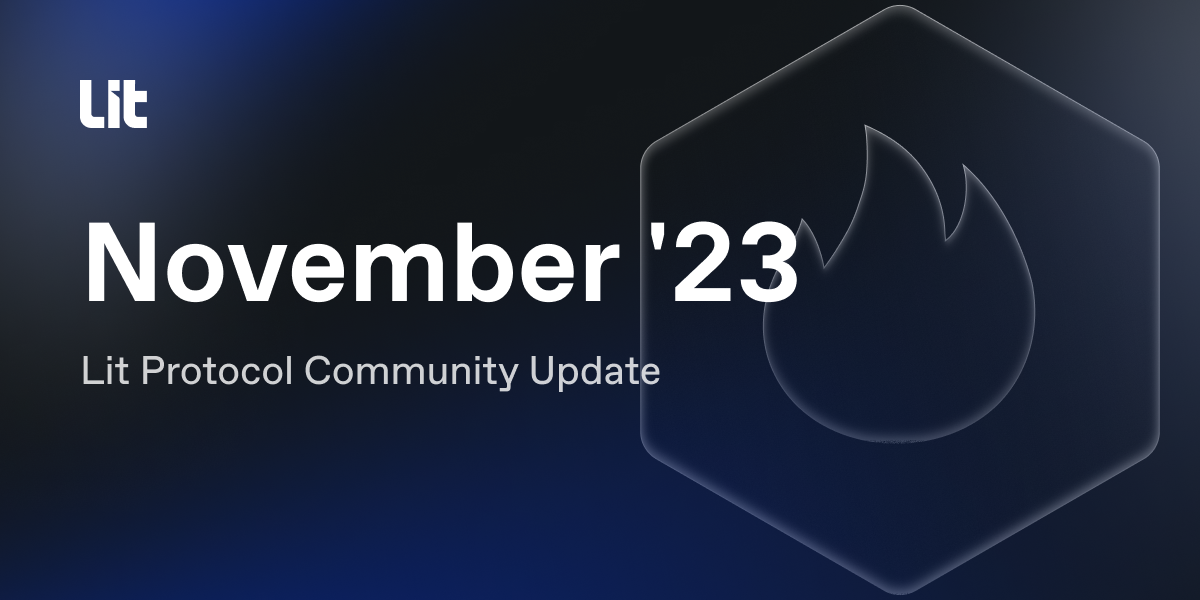Lit Protocol Community Update: November '23
Read about the latest updates from around the Lit ecosystem.

Lit is a decentralized key management network for encryption, signing, and compute. Create programmable applications and wallets that use secrets without single points of failure.
Intro.
Welcome to the eleventh monthly community update.
To learn more about Lit, check out the dev docs and join the community on Twitter and Discord.
General Updates.
Cayenne Network Beta Release
A new testnet, Cayenne, as well as a new version of the Lit SDK have been released in beta! These updates introduce two new powerful features to Lit:
- ID encrypt: This offers the same access control functionality as before, but it is much more scalable and secure. The core difference with ID encrypt is that only decryption requires communicating with the Lit nodes, whereas encryption becomes an entirely client-side process. Get started with ID encrypt today.
- Claimable Keys: Claimable keys allow you to send tokens to any authentication method supported by Lit (e.g. email / social login / SMS) which is used to deterministically generate a wallet for the user on the other side. In other words, "Send 5 USDC to bob@site.com", prior to Bob creating his wallet. Check out the docs on claimable keys to get started today.
Lit SDK V3
The Lit JS SDK V3 replaces the existing encryption algorithm (V2) and JWT signing processes with new cryptographic primitives to offer a more secure and seamless user experience. Several notable changes were made, including updated packages, methods, and types. A complete list of changes can be viewed in the developer docs.
The V3 SDK is currently only supported on the Cayenne network, and is not backwards compatible with either Jalapeno or Serrano. If you’d like to continue using either of those networks, you can do so using the V2 SDK.
The Lit development team recommends updating your application to use the V3 SDK prior to the launch of the Habanero Mainnet in December, as it will only be supported on V3. This can be done by following these migration instructions and checking out the related blog post.
If your app is currently live using the V1 or V2 version of the SDK, it is recommended that you perform the necessary updates internally while keeping users on the current branch until Habanero is live. After launch, you’ll need to perform the necessary key migration tasks:
- If you’re using encryption (AKA access control):
- If you’re using PKPs (AKA programmable wallets):
- Re-mint PKPs on Habanero.
Developer Update: Minting PKPs with the Lit SDK V3
When using the V3 SDK, additional permission scoping requirements have been introduced when working with PKPs. These scopes allow developers to fine-grain the kinds of data that individual PKPs are allowed to sign and are required when creating session signatures.
The blog post above aims to provide an overview of these new requirements and how they can be implemented. Additionally, you can use this tool to verify the permission scopes that have been set for each PKP.
Cayenne Smart Contracts Redeployed
Smart contracts on Cayenne have been re-deployed. If you’re using the latest version of the SDK (V3), you’ll have to re-mint any PKPs that were generated previously on the Cayenne branch.
The new contracts can be found here. You can install the SDK with the new contracts using npm install @lit-protocol/lit-node-client@cayenne
Website Revamp
The Lit website has gotten an overhaul! Check out the revamped site and learn about what’s possible with Lit 🔥☄️.
Around the Ecosystem.
Encrypting On-Chain Data with Irys and Lit
Irys is a provenance layer that stores data permanently on Arweave. Using Lit, you can encrypt your data before using Irys to store it eternally on the open web, all without requiring placing trust in a centralized custodian. Learn how following the development guide above.
Storing Encrypted Data on Ceramic
Ceramic is a decentralized data network that leverages the verifiable qualities you can expect from a blockchain, with cost efficiency and querying capabilities similar to a traditional database. Given Ceramic’s architecture, Lit's access control capabilities allow developers to gate access to content based on highly flexible conditions. For instance, granting ‘read’ access to all addresses that hold a specific NFT or ERC20 asset. Check out the tutorial above and get started building today!
Orange DAO Fellowship
If you’re building on Lit and searching for funding, consider the Orange DAO Fellowship Program, an intensive 10-week program designed to help launch the next Web3 unicorn**.** You can use the code “orangeislit” to get a priority review on your project!
Build an AI Chat Bot on Ceramic
This lesson on LearnWeb3 walks through the process of saving chatbot exchanges from OpenAI on Ceramic, in a completely privacy-preserving manner. Using Lit, this data can be encrypted prior to being stored on ComposeDB, ensuring only those who meet your conditions can access your data.
Lit x Alchemy Account Kit
You can now use Lit as a decentralized signer on a smart account using Alchemy’s Account Kit. This enables developers to provide their users with a secure, gasless, and seed-phraseless onboarding experience, significantly reducing the barriers to entry into web3!
Lit x Openfort
Openfort is a gaming wallet solution pushing blockchain boundaries & looking to radically simplify user interactions with the decentralized web. Using the new integration, developers can use Lit as a signer on an Openfort smart wallet account, while supporting onboarding using social accounts, one-time passwords, and passkeys. Get started following the development guide linked above.
Ecosystem Ideas
The Ecosystem Ideas page (previously ‘Ecosystem RFPs’) has been updated and moved to the Lit Protocol GitHub. If you are interested in building with Lit but not sure where to get started, check out the Ideas page which includes suggestions for projects and tooling with the goal of advancing what is possible with Lit’s suite of developer infrastructure. To learn more, check out this intro post.
Build with Lit
If you’re interested in integrating Lit into your existing project, or want to build something completely new using Lit infrastructure, check out the Lit grants program. Grants are offered to developers who have a passion for building innovative solutions to the current shortfalls of web3.
Community Calendar
To ensure you never miss a beat, subscribe to the Lit community calendar. Here you can find the schedule for Lit’s Office Hours, additional community events, conferences, announcements, and more.
Content Recap
Featured posts from the month of October.
Hackathons and Events
- ETHOnline recap: here is a look at some of the amazing projects built at ETHOnline this year:
- All Hail Hades: a SAFE module providing blockchain-based inheritance. Using Lit Protocol, user signatures are encrypted under specific inheritance conditions, including the address of the heir and timeframe. In case of prolonged inactivity, it assumes the user's demise and enables the heirs to claim signer rights securely.
- One Click dApp: this project allows you to build pretty and functional front ends for your smart contract and import them into your application as widgets. Lit is used to generate user crypto ID's using Google oAuth and encrypt the data submitted by each user.
- Lit Tornado: a mixer app like Tornado Cash but using Lit Protocol - achieving confidential transactions without zero-knowledge proofs using Lit Actions and PKPs.
- Spyd3r W3b: dApp development and maintenance, smart contract security and alerting, platform performance and analytics, and organization management are the pillar concepts of Spyd3r W3b. This project uses PKPs and Lit Actions to automate signing when particular predefined conditions are met.
- FRKT: no-code tools that provide a frictionless UX for any dApp. FRKT uses Lit for one-click wallet generation and gassless transactions using WebAuthn and Google oAuth for onboarding.
- Onboardr: Onboardr uses Claimable Keys to enable users to generate pre-calculated addresses for newcomers using their social account, email, or phone number. Send messages, payments, and rewards to users through simple intents before they even join the blockchain.
Coming soon 👀
Here are some of the things to look forward to in the months ahead:
- Decentralizing the Lit Network! Right now, test networks are running with a few node operators and the distribution process is ongoing. The decentralized testnet launch is imminent…
- The Lit Habanero Mainnet is slated to launch in December. Stability, performance, and scalability related improvements are currently being pushed prior to its release. This work will serve to significantly enhance the speed of signing, wallet creation, and decryption, all-in-all making Habanero highly performant at launch.
Wrapping up…
This wraps up the November update. If you enjoyed it, you can click below to subscribe and receive future updates directly in your inbox.
Once again, you can reach out to the Lit development team on Discord with any questions, concerns, or feedback.
Until next time,
alt signing out.

